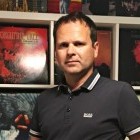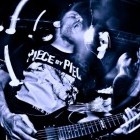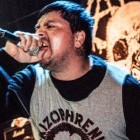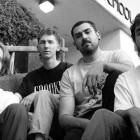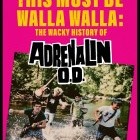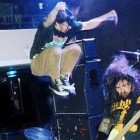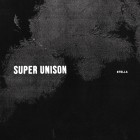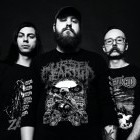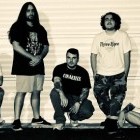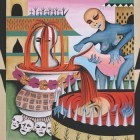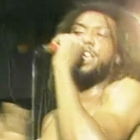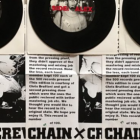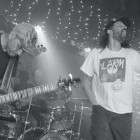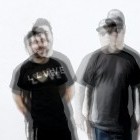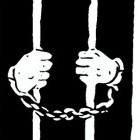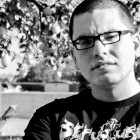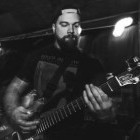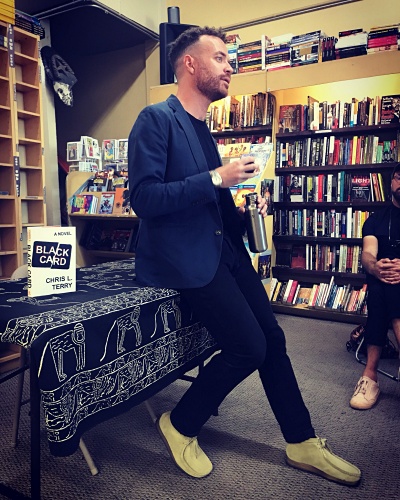
It's always such a treat to see someone from the hardcore scene represent our community with style and grace. That's why I was psyched to read Black Card, the latest novel by author Chris L. Terry. Before he was a novelist and creative writing teacher, Chris was part of the Richmond, Virginia hardcore scene, fronting the bands Flesh Eating Creeps and Light the Fuse and Run.
An ethralling story that I devoured in two sessions just a week ago, Black Card centers around a mixed-race punk rock musician and his struggles with identity. This is a subject the author is very familiar with, being born to an African-American father and an Irish-American mother.
There were moments when I laughed out loud because as a Latino kid in a predominantly music scene, I had gone through some of the ridiculous yet true situations the unnamed narrator goes through in the book.
So, while the subject matter is certainly a heavy one, Black Card is written with so much warmth and humor that by the end of it, what I sensed more than anything was the narrator's wanting to connect with other people, irregardless of what their race was.
With his deep background in the hardcore community, it was with great pleasure that I chatted with Chris about Black Card, his previous life as a musician, and what he's working on next.
First off, why don’t we give the No Echo readers a bit of background on you and your entry into the hardcore community. I know the Richmond scene of the late ‘90s is near and dear to your heart.
My name is Chris L. Terry and I went to high school and college in Richmond, Virginia. My latest novel, Black Card, is fiction inspired by my struggle to understand my mixed-race black identity while active in the Richmond punk scene at the turn of the century.
It’s a book for anyone who has ever felt like “the black friend.”
From 1995 to 2000, I sang for a band called Flesh Eating Creeps. We kinda sounded like Void falling down a flight of stairs. From 2000 to 2003, I sang for a band called Light the Fuse and Run. We were on Level Plane Records, part of that early ‘00s screamo scene that just pre-dated MySpace emo. We sounded a bit like Fugazi, Refused and Hot Snakes, and got to tour the US twice and go to Europe.
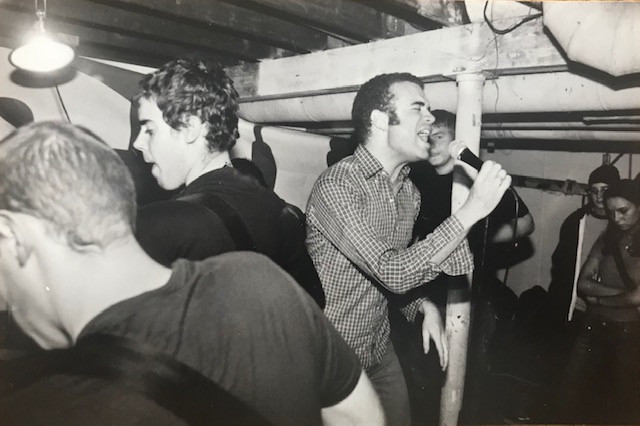
What were some of the books that fired you up about writing in the first place? Also, did you learn about certain books/authors through learning about them through bands and music you listened to growing up? I know for me, that’s definitely the case.
In the late ‘90s, there was a trend of bands being like, “This song is inspired by this philosophy text I read last semester. BLAAAGH WAAAAGH AAAAAGH.” That got me banging my head but didn’t make me want to read.
Since I was a teenager, I knew I wanted to write, but had a hard time finding books that made me feel like I could do it. I had a professor at VCU named Tom De Haven who got me into classic private eye fiction like Raymond Chandler. A lot of those books are basically excuses for moody drunk dudes to roam around cities alone, talking shit to people, and that struck a chord with little punk me.
I read Autobiography of an Ex-Colored Man in a Harlem Renaissance class and that was the first time I read anything about black people passing for white, which is something I often do by accident. It was an eye-opener.
A couple years later, my girlfriend--now my wife--put me on to the White Boy Shuffle by Paul Beatty. That was the first time I read something that lovingly poked fun at the experience of not feeling “black enough.” I needed that.
I should point out that the White Boy Shuffle is relatively new. There’s a ton of great writing coming out now that shares perspectives and experiences that are not present in the literary canon--the list of white men you probably read in high school and college. Give new books a try. They’re better.
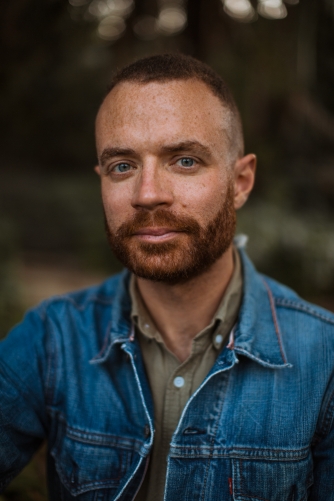
I found myself thinking to myself, “that happened to me!” and “I can relate to that!” so many times while reading Black Card because I was a Latino kid who loved what many people in my neighborhood deemed “white music,” whether that was hardcore, metal, synthpop, or anything that wasn’t hip-hop. I’m sure it’s still happening, but it’s got to be better these days, right? Have you heard from readers who also dealt with that kind of thing?
I was just playing one of my dad’s old Hendrix records. Being a black dude who likes rock music runs in my family!
Black Card is set a couple years before James Spooner’s AfroPunk documentary, a few years before TV on the Radio and that awkward New York Times article about “blipsters,” seven years before the blogs went nuts when Jay-Z and Beyonce watched a Grizzly Bear gig. I wanted to capture that time when it was just straight-up unusual for people of color to be involved in punk or alternative culture.
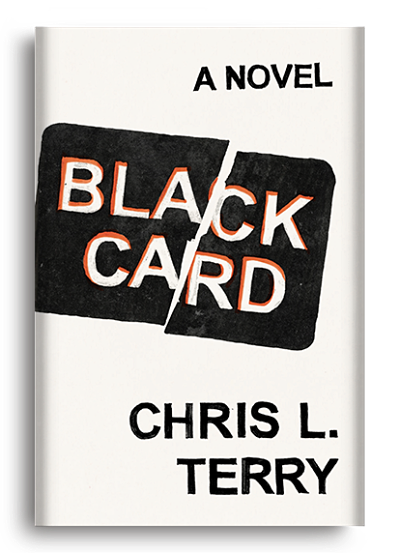
The book’s hitting hardest with people who’ve had that “into white shit” experience. So, it’s not exactly a best-seller, but it’s finding its people.
And, I do feel like punk is a lot more diverse now. It’s no longer just a white boys’ club. My book tour brought me to #blkgrlswurld Fest in Philly this past fall and I was in a room of all the punks-of-color I was looking for when I was younger and more active in the scene. It was an amazing, affirming experience. Now, I’m out here listening to Soul Glo like WHERE WERE Y’ALL WHEN I NEEDED YOU?
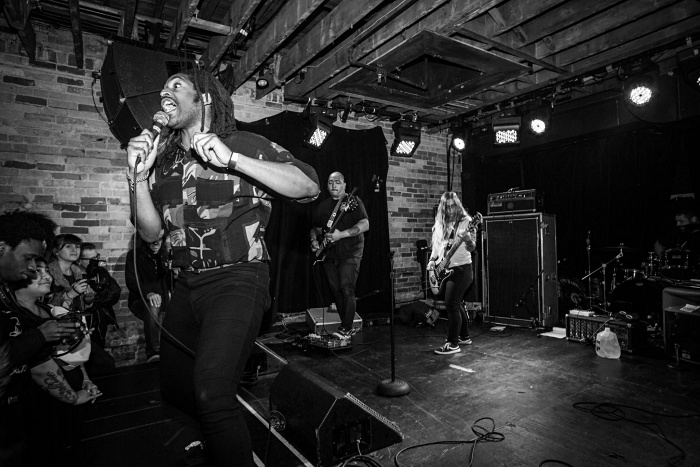
Though the subject matter certainly isn’t an easy one to tackle, I love how you managed to still make me laugh throughout moments in Black Card. How tough was that to balance in the edit?
I’m a strong believer in using humor to address serious topics. Putting that sugar in the medicine breaks the tension and frees up the conversation. I really wanted to capture Richmond and the general atmosphere of punk trash talk in Black Card, so I went hard on the jokes and asides in earlier drafts.
As I edited, I kept pulling it back so the humor didn’t dilute the story or the more serious moments. My Editor at Catapult, Mensah Demary, helped me trim it down even more. By the time I was working with him, I was just like, “Sure. Cut it. Let’s just get this dang thing done.”
Since the book has been out, how many times have you had to answer the question, “how much of that happened to you?”
Black Card is fiction inspired by my experiences as a black punk. The feelings and the street names are real, but that’s about it.
For some readers, part of the fun is figuring out what parts of a book are pulled from the author’s life. That’s fine. I’m just glad they’re reading my book. And, I’ve got “The book is Fiction!” saved on my phone’s Clipboard for when they contact me.
I mean, a friend who I hung out with all the time in Richmond hit me up like, “I forgot that you played bass in that band.” I didn’t!
Are there plans for a film version of Black Card? Reading it, it’s not hard imagining scenes playing out with actors.
Thank you. I try to write really visually and I love doing dialogue.
The book’s been optioned for TV, which is amazing and flattering and exciting, but I’m not sure how much else I’m allowed to say. I’d love to see weird, gritty, beautiful Richmond on the screen (and pay off my student loans), so fingers crossed.
What else are you up to on the writing front? Do you have a novel in the works?
I’m working on my third novel. It’s a little too early in the process to describe it, but I’m trying to branch out stylistically. I’m also trying something new process-wise: writing a long-ass outline with the hope that I can get through more of the trial and error at this stage instead of writing a whole draft then being like, “Eh. This character’s gotta go. Time to rewrite!”
Beyond that, I’m doing my first couple of screenwriting jobs right now and teaching novel-writing classes online. I was working at a depressing startup before this, so I’m very thankful that my new job is something that I like to do. That’s the dream.
Can you recommend some other authors/books you think No Echo readers might enjoy that folks might not know about?
My favorite recent novel is New People by Danzy Senna. It deals with the intricacies of mixed-race identity while mercilessly spoofing bougie/boho black people in ‘90s NYC. The main character makes you go, “No. What are you doing? Stop that!” while you read. It’s evil and compact and I love it.
Parable of the Sower by Octavia Butler is about a pack of young people creating their own mini society, so it oughta warm some DIY punk hearts. It’s set shortly after society’s collapse, and some people say it predicted the Trump presidency, so it can be a stressful read, but it’s really good.
Jeff Jackson writes really knowingly about punk and indie music scenes in his novels Mira Corpora and Destroy All Monsters: The Last Rock Novel. He conjures a great ominous, dream-like atmosphere, too.
If you’re one of those narrow-minded punks who only reads books about music (shots fired!), I suggest anything by Hanif Abdurraqib. My personal favorite of his is Go Ahead in the Rain. It’s about A Tribe Called Quest, but you learn more about why someone might love that group than you learn about the actual group. In it, he strikes a really deft balance between the personal and the reported.
***
Black Card is out now via Catapult and available on Amazon.
Chris L. Terry on social media: Twitter | Instagram
Tagged: book

